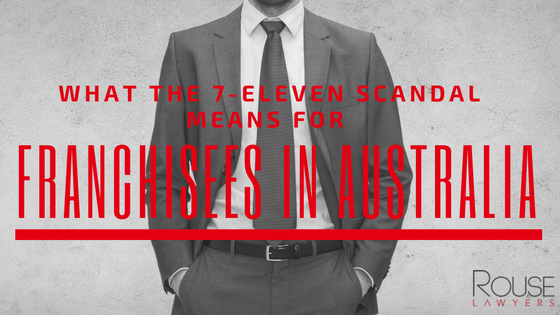For Franchisors: What Are My HR Responsibilities To Franchisee Employees In Australia?
The employee underpayment scandal and subsequent investigation by the Fair Work Ombudsman into retail convenience chain 7-Eleven has prompted the franchise industry to scrutinise the responsibilities franchisors owe to franchisee employees in Australia.
Are franchisors responsible for the actions of franchisees?
Under the Franchising Code of Conduct and under the typical franchise agreement, franchisors are not responsible for the actions of franchisees towards their employees. Franchisors and franchisees are legally and financially independent parties.
In essence, a franchise agreement is an agreement that allows a franchisee to carry on their own independent business in accordance with the franchisor’s model. Franchisees are obliged to run their own business, while at the same time abide by the principles of uniformity of the system regarding the products or services offered in their businesses.
Franchise agreements will commonly provide that franchisees are responsible for complying with industrial relations laws by paying employees the correct award, tax and superannuation.
The 7-Eleven payment scandal case study
In response to the employee underpayment allegations, the franchisor of 7-Eleven established an independent investigation panel, introduced changes to its business model and made commitments to provide compensation to underpaid franchisee employees. The franchisor’s response to the situation might be distinguished from how many other franchise systems might react because the 7-Eleven business model provides a profit share arrangement between the franchisor and its franchisees.
In most franchise systems there is no profit share, but the franchisor receives a regular franchise fee from franchisees, which may be a set royalty or an amount based on the franchisee’s performance. In the usual case, the franchisor is removed from the day-to-day running of the business such as paying wages and rent, which is the responsibility of the franchisee.
The liability of franchisors may, however, shift under a new policy proposed by the government prior to the recent federal election. To date, we are still waiting to see whether legislation is introduced to give effect to the policy.
How can franchisors support franchisees and protect their brand?
Even in the case of legislative changes, it is good practice for franchisors to take the following steps towards supporting franchisees whilst protecting their brand.
1. Have a well drafted franchise agreement that clearly outlines the obligations of the franchisor and franchisee in respect to workplace laws.
2. As part of the ongoing support to franchisees, provide disclosure of wage costs before entering into a franchise agreement and provide avenues of support during the term of the franchise agreement. This can be achieved by directing a franchisee’s attention to resources available on government websites that outline employer obligations.
3. Monitor franchisees and request regular reports regarding employment. If a franchise agreement allows for a franchisor to request reports regarding a franchisee’s business, then the franchisor can monitor the number of employees and wages paid by the franchisee. This can provide the franchisor an opportunity to identify any arrangements that may warrant further investigation.
4. Carry out regular compliance audits of franchised businesses. If a franchisee is found to be engaging in wage underpayment, then, depending on the terms of the franchise agreement, this can be grounds for the franchisor to issue a breach notice requiring the franchisee to remedy the situation. Regular audits will also act as a deterrent to other franchisees who will be aware that audits are commonplace and that consequences for non-compliance with employment laws are enforced.
5. Encourage feedback. Both franchisees and their employees should feel comfortable approaching a franchisor in respect to issues with the system. Employees should not feel that they are prevented from raising employment concerns with the franchisor. Whilst a franchisor is not responsible to pay the employee’s wages, franchisors can hold franchisees accountable to comply with their franchise agreements.
6. Listen to concerns that franchisees raise regarding the system and don’t ignore issues. It is in the best interests of franchisors to ensure that franchisees are operating their businesses adequately. If franchisees are struggling to pay their employees the proper entitlements, and if this is a widespread concern, that could indicate the need to review the structure of the franchise system.
7. Treat franchisees with uniformity. Franchisors could be accused of breaching their good faith obligations under the Franchising Code of Conduct if they single out a particular franchisee. If audits are to be carried out and consequences for non-compliance enforced, then all franchisees must be treated equally.
By implementing these strategies, franchisors can ensure that their franchisees in Australia are complying with their legal obligations towards employees. At the same time, franchisors can protect the reputation of their brand and goodwill of the franchise system.

